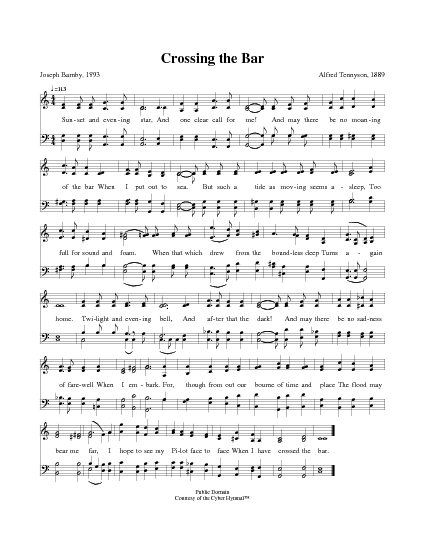Go Ad-Free
If you regularly use Hymnary.org, you might benefit from eliminating ads. Consider buying a Hymnary Pro subscription.
If you regularly use Hymnary.org, you might benefit from eliminating ads. Consider buying a Hymnary Pro subscription.

1 Sunset and evening star,
And one clear call for me!
And may there be no moaning of the bar
When I put out to sea,
But such a tide as moving seems a sleep,
Too full for sound and foam,
When that which drew from out the boundless deep
Turns again home, turns home.
2 Twilight and evening bell,
And after that the dark!
And may there be no sadness of farewell
When I, when I embark;
For tho' from out our bourne of time and place
The flood may bear me far,
I hope to see my Pilot face to face
When I have crossed the bar.
Source: Praise for the Lord (Expanded Edition) #117
 Tennyson, Alfred, Lord, son of the Rev. G. C. Tennyson, Rector of Somersby, Lincolnshire, was born at Somersby, Aug. 6, 1809; educated at Trinity College, Cambridge; appointed Poet Laureate in 1850, and raised to the Peerage in 1884. Although Lord Tennyson has not written any hymns, extracts from his poems are sometimes used as such, as "Strong Son of God, immortal Love" (Faith in the Son of God), from the Introduction to his In Memoriam, 1850; the well-known "Too late, too late, ye cannot enter now," and others. The former is sometimes given as "Spirit of immortal Love," and again as "Eternal God, immortal Love."
--John Julian, Dictionary of Hymnology, Appendix, Part II (1907)
Go to person page >
Tennyson, Alfred, Lord, son of the Rev. G. C. Tennyson, Rector of Somersby, Lincolnshire, was born at Somersby, Aug. 6, 1809; educated at Trinity College, Cambridge; appointed Poet Laureate in 1850, and raised to the Peerage in 1884. Although Lord Tennyson has not written any hymns, extracts from his poems are sometimes used as such, as "Strong Son of God, immortal Love" (Faith in the Son of God), from the Introduction to his In Memoriam, 1850; the well-known "Too late, too late, ye cannot enter now," and others. The former is sometimes given as "Spirit of immortal Love," and again as "Eternal God, immortal Love."
--John Julian, Dictionary of Hymnology, Appendix, Part II (1907)
Go to person page >| First Line: | Sunset and evening star |
| Title: | Crossing the Bar |
| Author: | Alfred Tennyson, Baron Tennyson (1889) |
| Meter: | Irregular |
| Language: | English |
| Copyright: | Public Domain |
Sunset and evening star. Alfred Lord Tennyson. [Death and Burial.] In Lord Tennyson's Memoir of his father, vol. ii,, p. 366, he gives this account of the writing of this hymn:—
"'Crossing the Bar,' was written in my father's eighty-first year, on a day in October [1889] when we came from Aldworth to Farringford. Before reaching Farringford he had the moaning of the bay in his mind, and after dinner he showed me this poem written out. I said, 'That is the crown of your life's work.' He answered, 'It came in a moment.' He explained the 'Pilot' as ‘That Divine and Unseen Who is always guiding us.’ ... A few days before my father's death [1892] he said to me, 'Mind you put "Crossing the Bar" at the end of all editions of my poems.' ... My father considered Edmund Lushington's translation into Greek of 'Crossing the Bar' one of the finest translations he had ever read."
This translation into Greek is given in the Memoir. The hymn was first published in Lord Tennyson's Demeter and other Poems, 1889, p. 174.
--John Julian, Dictionary of Hymnology, New Supplement (1907)


 My Starred Hymns
My Starred Hymns